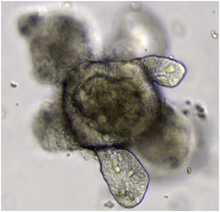Organoids are miniature, simplified versions of organs that are produced in vitro from stem cells, primary cells and cancer cells. They are self-organizing 3D cellular structures that replicate some of the key biological aspects of real organs, making them a useful tool for research and drug development.
Organoids are usually derived from stem cells, including adult stem cells, embryonic stem cells, or induced pluripotent stem cells (iPSCs). They mimic the 3D structure of the organ they represent, including the multiple cell types that are found in that organ. Organoids exhibit some functions of the actual organs, such as secretion, absorption, and responsiveness to stimuli. Organoids have several uses in research including disease modeling, genetic studies, tissue regeneration and personalized medicine. They are used to model diseases, allowing researchers to study the pathology and progression of diseases like cancer, neurological disorders, infectious diseases, all in a controlled environment.
Organoids can be used to study genetic variations and their effects on organ development and disease. Research is ongoing to study how organoids can be used for tissue engineering and regenerative medicine as well. Lastly, organoids hold huge potential for use in personalized medicine. Organoids can be generated from patient derived cells, enabling the study of individualized responses to treatments, without having to test on the patient themselves.
In terms of drug development, organoids are useful for drug screening, testing, and mechanistic studies. Organoids provide a more accurate model for testing drug efficacy and toxicity, as compared to more traditional 2D cell cultures. They help in understanding how drugs interact with organ specific cells, which can lead to the development of more effective drugs. Not only do organoids allow for a more in vivo relevant model, but they also can reduce the need for animal testing in the early stages of drug development, which is both ethical and cost effective.
To learn more about animal alternative methods, see our blog post on the FDA Modernization Act 2.0, which allows the FDA to bring drugs to human trials without needing to first test in animal models. In summary, organoids represent a significant advance in biomedical research. They bridge the gap between traditional cell culture and animal models, offering a more accurate and ethical alternative for studying human biology, disease mechanisms, and drug development.
Organoids and Cancer
Specifically, organoids are proving to be a viable tool in cancer research, particularly in the development and testing of treatments. Organoids provide the ability to model cancer more accurately than traditional 2D methods. Organoids can be grown from cancer cells taken directly from a patient’s tumor, allowing for researchers to mimic the 3D structure and cellular diversity of actual tumors more closely than 2D cell cultures. Tumors are often composed of a diverse array of cell types.
Organoids can maintain this heterogeneity, which is crucial for understanding how different cancer cells within a given tumor may respond to treatments. This also allows for patient specific drug responses in personalized medicine, by creating organoids from patient tumor cells, testing how that individual’s cancer responds to various treatments. This approach can help identify the most effective and least toxic treatment for each patient. Beyond individualized medicine, organoids can also be used in large scale drug screening efforts to identify potential new cancer drugs, or to repurpose existing drugs.
Organoids can also be used to develop combination therapies, testing combinations of drugs which may be more effective than individual treatments and prevent or overcome drug resistance. Mechanisms of resistance can be studied by exposing cancer organoids to various drugs over time to study how and why cancer cells develop resistance to certain treatments.
Organoids provide a more accurate model than animal testing or 2D cell cultures to assess efficacy and safety of cancer treatments, due to their complexity and relevance to human biology. However, there are challenges to the use of organoids in cancer research. One such challenge is the issue of scalability and reproducibility. Additionally, many cancers organoid models lack immune system components, which are crucial in cancer development and treatment. Ongoing efforts to better integrate these immune system components to organoids will help to improve these systems and make them even more relevant to in vivo human biology. In conclusion, organoids offer a unique and powerful platform for cancer research, enabling more precise and personalized approaches.
SBH Sciences and Organoids
SBH Sciences works in partnership with Bonds Biosystems, a company working on the development of human physiologically relevant organoids to provide in vitro 3D solutions to aid in disease understanding, and treatment development. Specifically, Bonds Biosystems grows human mini organs, fat [https://bondsbio.com/adipose-tissue-models-1] and heart organoids [https://bondsbio.com/heart-models] relevant to obesity and cardiometabolic diseases, respectively. Their work focuses on helping to bring solutions to the growing obesity epidemic. More than 40% of the United States population is obese, with more than 70% considered overweight. They are working to aid the development of drugs via their 3D BioSolTM platform of mini organs, engineering and manufacturing scaffold free adipose tissue and heart models, with vascular organoids in the works. Here at SBH Sciences we assist in providing meaningful readouts via our vast list of cell-based assay services. Look at our ‘Services’ tab above and contact us to see how we can help accelerate your drug discovery and development.
Sources:
https://bondsbio.com/ https://www.cdc.gov/obesity/data/adult.html#:~:text=Obesity%20is%20a%20common%2C%20serious,NHANES%2C%202021)
Zhao, Z., Chen, X., Dowbaj, A. M., Sljukic, A., Bratlie, K., Lin, L., Fong, E. L., Balachander, G.M., Chen, Z., Soragni, A., Huch, M., Zeng, Y. A., Wang, Q., & Yu, H. (2022). Organoids. Nature Reviews Methods Primers, 2(1). https://doi.org/10.1038/s43586-022-00174-y
Jiang, X., Oyang, L., Peng, Q., Liu, Q., Xu, X., Wu, N., Tan, S., Yang, W., Han, Y., Lin, J., Xia, L., Peng, M., Tang, Y., Luo, X., Su, M., Shi, Y., Zhou, Y., & Liao, Q. (2023). Organoids: opportunities and
challenges of cancer therapy. Frontiers in cell and developmental biology, 11, 1232528. https://doi.org/10.3389/fcell.2023.1232528


